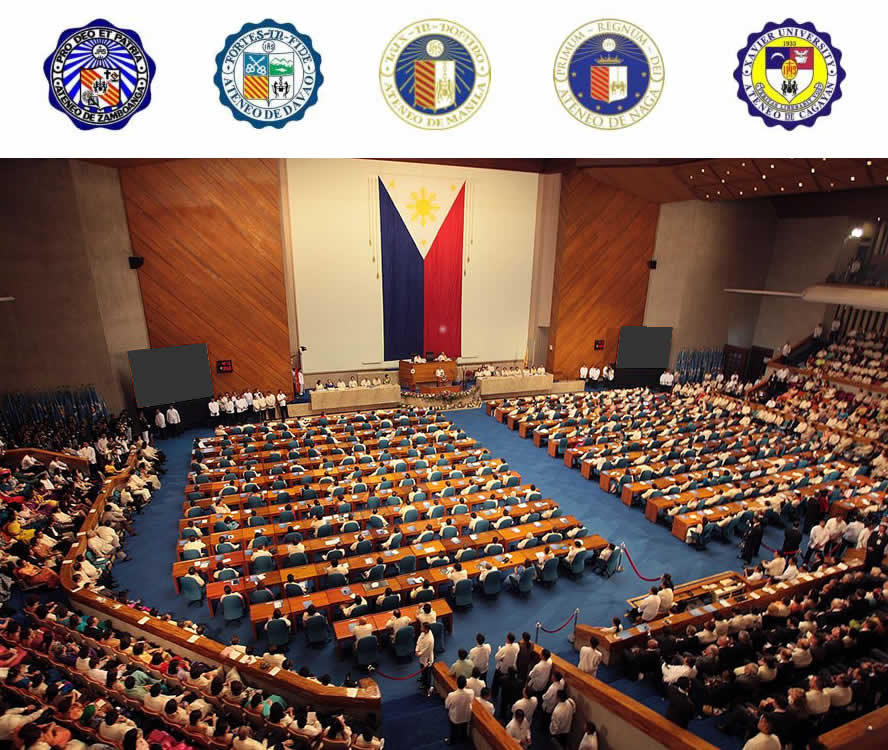|

Top graphic: Ateneo school emblems. Bottom photo: Philippine House of Representatives Graphic credits: ateneo.edu and Robert Viñas/pcoo.gov.ph
Originally
targeted to be voted on in February or March of 2019, Resolution of Both
Houses number 15 (RBH 15), shepherded by no less than former president
and current Speaker Gloria Macapagal-Arroyo, passed the lower house by a
224-22-3 vote on December 11, 2018. Below is the joint statement of all
5 Ateneo University presidents regarding this resolution.
 The move to amend the Philippines’ 1987 Constitution has been one of
the most contentious issues of 2018. According to the latest Pulse Asia
survey held in June 2018, only 18% of our population support charter
change, while a majority (67% of the population) do not. An additional
14% are undecided. The same poll also indicated that 62% of Filipinos
are not presently in favor of a shift to a federal form of government.
The move to amend the Philippines’ 1987 Constitution has been one of
the most contentious issues of 2018. According to the latest Pulse Asia
survey held in June 2018, only 18% of our population support charter
change, while a majority (67% of the population) do not. An additional
14% are undecided. The same poll also indicated that 62% of Filipinos
are not presently in favor of a shift to a federal form of government.
Regardless of where one sits on this issue, the ongoing discussion and
debate is a healthy one for our democracy. Evidence-based discussion and
debate is critical in crafting reform options for the country’s
governance and development. An inclusive and transparent process is
indispensable in establishing a credible result, one that hopefully
could unite the country in a common understanding of the way forward.
Sadly, this process of deliberation has been undermined and hijacked by
the recent move by Congress to push for charter change. Last 12 December
2018, amidst the backdrop of allegations of pork barrel spending in the
proposed 2019 budget, the Lower House of Congress passed Resolution of
Both Houses number 15 (RBH 15) on third and final reading, pushing what
many see as charter change that is being railroaded.
RBH 15 dramatically departs from the reform process initiated by
President Duterte, which called on the Constitutional Committee to
Review the Constitution (ConCom) to help push debates and discussions on
constitutional reforms.
There are at least three troubling features of RBH 15. First, it
excludes important political reforms proposed by the ConCom and
supported widely by academia, such as the proposed anti-dynasty law, and
a clear political party reform agenda. RBH 15 even removes all reference
to political dynasties, which were already embedded in the 1987
Constitution.
Secondly, the resolution also removes existing term limits for
congressmen, senators, and local government officials. Combined with no
constraints on dynastic expansion, this threatens to further concentrate
political power into the hands of very few political clans.
Thirdly, the resolution jettisons Article XIII of the 1987 Constitution,
dedicated to “Social Justice and Human Rights”, a section explicitly
recognized by 1986 Constitutional Commission’s President as the “heart”
of the said charter (Muñoz-Palma 1986). By eliminating this entire
article, RBH 15 weakens the State’s commitments on the protection of
labor, the promotion of equitable land ownership and access to natural
resources, the promotion of urban land reform and affordable, decent
housing for the urban poor, the protection of the rights of indigenous
peoples, and the role of peoples’ organizations, among others.
These features of RBH 15 alone, combined with the unreasonable pace and
non-inclusive process, are likely to exacerbate further the trust
deficit that presently characterizes the federalism discussions.
For these reasons, we call on our legislators to stop fast-tracking the
charter change process, and to take the proper steps to consult all
sectors in order to re-establish credibility and trust in the process.
Imposing their will on the people will only elicit stronger resistance
to federalism, as many will see this only as a ploy of dynastic
politicians to further strengthen their hold on power.
Charter change is a difficult arena for reforms. Clearly, a transition
to a federal system cannot be bound by a constricting timetable such as
the term of President Duterte. Empirical evidence, substantial
independence and objectivity will be critical in forging a consensus.
Anything less than these merely exposes the true intentions of the
so-called “reformists”.
Therefore, we urge the administration to undertake instead a wider and
more consultative discussion on constitutional reform. Only by
undergoing a genuine and participatory national dialogue will Filipinos
attain a level of consciousness where they can properly decide whether
to change the charter or not.
We in the academe, along with the Catholic Educational Association of
the Philippines (CEAP) and the Coordinating Council of Private
Educational Associations (COCOPEA), and working with other stakeholders
in our society including the Catholic Bishops’ Conference of the
Philippines (CBCP), are willing to help bring about this national
conversation on constitutional reform by working with our colleagues in
government, civil society, and the private sector.
ad majorem Dei gloriam,
Fr Karel S San Juan SJ (President, Ateneo de Zamboanga University)
Fr Joel E Tabora SJ (President, Ateneo de Davao University)
Fr Jose Ramon T Villarin SJ (President, Ateneo de Manila University)
Fr Roberto Exequiel N. Rivera, SJ (President, Ateneo de Naga University)
Fr Roberto C Yap SJ (President, Xavier University- Ateneo de Cagayan)
Published 12/21/2018
|